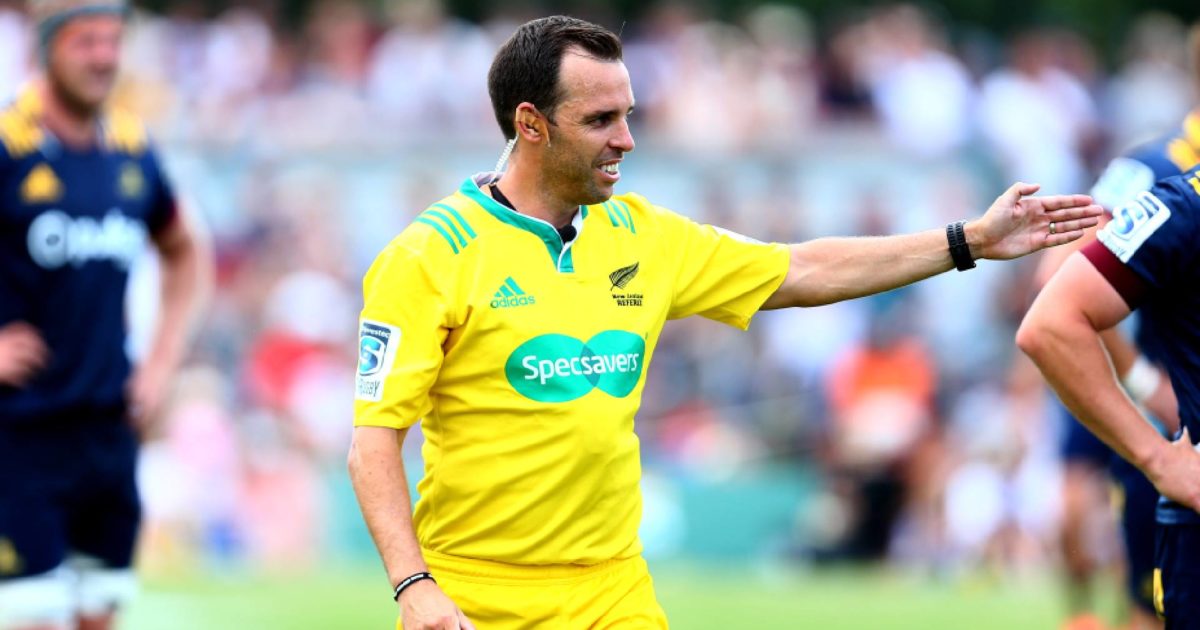Ex-All Black's three suggestions to help players and fans adjust to the new Super Rugby Aotearoa laws

The opening weekend of Super Rugby Aotearoa has been largely lauded as a success as huge crowds flocked to Forsyth Barr Stadium and Eden Park to watch the first matches of professional rugby since the coronavirus outbreak.
Bryn Gatland’s last-minute drop goal to steal a dramatic win for the Highlanders against the Chiefs – coached by his father Warren – and Beauden Barrett’s victorious Blues debut against his former side, the Hurricanes, were the two key talking points from the weekend’s action.
One point of confusion, though, was the interpretation of the new laws introduced to the New Zealand domestic competition.
The changes mostly focused on dealing with offsides and infringements at the breakdown, with referees imposing stricter officiating tactics throughout both matches.
Breakdown's been a real battle early doors. Lots of adjustments for players! #HIGvCHI pic.twitter.com/XQY9CrpnHq
— EK Rugby Analysis (@ek_rugby) June 13, 2020
Increased stringency on policing those two aspects of the game is expected throughout the entirety of Super Rugby Aotearoa, with the aim of creating a safer game at the breakdown and more space for attacking sides against rushing defences.
That resulted in a total of 58 penalties being blown across the weekend, with 80 percent of those going against the attacking team.
Speaking on Sky Sport‘s The Breakdown on Tuesday, former Chiefs playmaker and recently-retired referee Glen Jackson said he was unsurprised by the high penalty count, but believed it was for the greater good of the game.
“First of all, I don’t think it was a surprise,” he told host Jeff Wilson. “What they were told was going to happen, actually happened, so that’s good.
“For a refereeing team, they can quite often go out and feel the pressure that there’s too many penalties and go off the ball a little bit, but they actually delivered what they were told to do, which is what coaches want.
“I think the best one is the offside penalty. The last round of Super Rugby before COVID, there were 12 penalties in six games for offside. We had 12 penalties in two games [on the weekend]. As a coach, you want space in the game.
“The biggest thing I ever hear as a referee is ‘Why aren’t you reffing the offside line?’.
“So, there were some tight penalty calls, [but] you would rather see offside than these fast line speed [defences] that you’re seeing in the game now, just shutting down people’s opportunities, and I think that’s a really good positive.”
Former All Blacks wing Sir John Kirwan agreed with Jackson’s sentiments that stricter officiating of the offside line can be regarded as a positive to take out of the weekend.
However, the ex-Italy, Japan and Blues coach said there’s still not enough clarity for fans surrounding law interpretations made by referees of whom he believes are still under too much pressure.
“I thought the ref on Sunday [for the Blues vs Hurricanes match] was pedantic, it’s not his fault, and I don’t want to beat up on refs because I think they’re doing a great job,” Kirwan said.
“Bryce Lawrence [New Zealand Rugby referees manager] has told them to be really strong in the first week or so, so that the players understand, but I think there’s too much, still, on the referee.
“There’s a couple of things I’d like to change. I go down to the sideline, and there’s people saying ‘What the bloody hell’s that for?’. People don’t know what the rule’s for.”
https://www.instagram.com/p/CBgugnXA-6U/?utm_source=ig_web_copy_link
That led Kirwan to devise three ideas that could help make the game faster and easier to understand.
“Let’s say [there’s] still a lot of penalties after three weeks… after three penalties, of the same team, five-minute yellow card [should be handed out], because then players will stop pushing the law.
“30 seconds – like the basketball rule – when it’s a penalty, you kick for the touchline, you’ve got to throw the ball in within 30 seconds, so we’re speeding the game up.
Lastly, Kirwan suggested the implementation of a ref microphone so punters could hear the officials to understand what call is being made and why it was called that way.
Jackson didn’t fully support that final concept, however, highlighting the audio quality as one of two key reasons why such an innovation might not be so successful.
“I’ve reffed in a game where it’s happened at the stadium, and it sounds terrible,” Jackson said. “Not everyone actually wants to hear that.
“I like the idea of the public understanding what the referee’s decision is, but if I’m taking my nine-year-old daughter, she doesn’t want to hear the ref talking over the stadium.”
Instead, the former Saracens, Bay of Plenty and Maori All Blacks pivot offered a potential alternative.
“In the UK, they actually had a referee up on the big screen showing the signal, so it was just a signal with a caption underneath, so if you saw it, you saw it and understood the decisions.”
The new law interpretations will no doubt come back under the microscope this weekend when the second round of Super Rugby Aotearoa kicks-off between the Chiefs and Blues in Hamilton on Saturday.
That match will be followed by a clash between the Hurricanes and the back-to-back-to-back reigning Super Rugby champion Crusaders, who will make their first appearance in the new-look competition in Wellington on Sunday.































































































